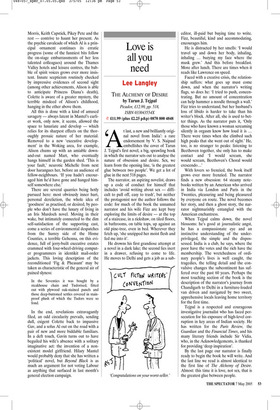Love is all you need
Lee Langley
THE ALCHEMY OF DESIRE by Tarun J. Tejpal Picador, £12.99, pp. 518, ISBN 033043554X ✆ £11.99 (plus £2.25 p&p) 0870 800 4848 ‘A t last, a new and brilliantly origi nal novel from India’: a rare endorsement by V. S. Naipaul embellishes the cover of Tarun J. Tejpal’s first novel, a big, sprawling book in which the narrator sets out to analyse the nature of obsession and desire. Sex, we learn from the opening line, ‘is the greatest glue between two people’. We get a lot of glue in the next 518 pages.
The narrator, an aspiring novelist, draws up a code of conduct for himself that includes ‘avoid writing about sex — difficult to pull off, easy to trash’, but neither the protagonist nor the author follows the code: for much of the book the unnamed narrator and his wife Fizz are kept busy exploring the limits of desire — at the top of a staircase, in a rickshaw, on tiled floors, in bathrooms, on table tops, up against an old pine-tree, even in bed. Wherever they fetch up, ‘she unzipped her moist flesh and fed me into it’.
He drowns his first grandiose attempt at a novel in a dark lake; the second lies inert in a drawer, refusing to come to life. He moves to Delhi and gets a job as a sub editor, ill-paid but buying time to write. Fizz, beautiful, kind and accommodating, encourages him.
He is distracted by her smells: ‘I would travel up and down her body, inhaling, inhaling ... burying my face where the musk grew.’ And this before breakfast. More after lunch. There are times when it reads like Lawrence on speed.
Faced with a creative crisis, the relationship suffers: what goes up must come down, and when the narrator’s writing flags, so does he: ‘I tried to push, concentrating. But no amount of concentration can help hammer a noodle through a wall.’ Fizz tries to understand, but her husband’s loss of libido is harder to take than his writer’s block. After all, she is used to better things. As the narrator puts it, ‘Only those who have known a woman screaming silently in orgasm know how loud it is ... There were times when she climbed such high peaks that she went out of sight.’ He, too, is no stranger to peaks: listening to Beethoven together, she only has to make contact and ‘I would scream, she would scream, Beethoven’s Choral would crescendo...’ With lovers so frenzied, the book itself grows ever more frenzied. The narrator finds a new obsession: 64 steamy notebooks written by an American who arrived in India via London and Paris in the Twenties, pleasuring and being pleasured by everyone en route. The novel becomes her story, and then a ghost story, the narrator nightmarishly entangled with the American enchantress.
When Tejpal calms down, the novel blossoms: he’s good at journalistic angst, he has a compassionate eye and an instinctive understanding of the underprivileged, the simple and the dispossessed. India is a club, he says, where the poor have the votes and the rich have the membership. The wretchedness of ordinary people’s lives is well caught, the tragedies, the telling detail and the convulsive changes the subcontinent has suffered over the past 60 years. Perhaps the most touching section of the book is the description of the narrator’s journey from Chandigarh to Delhi in a furniture-loaded van driven and navigated by two sweet, apprehensive locals leaving home territory for the first time.
Tejpal is a respected and courageous investigative journalist who has faced persecution for his exposure of high-level corruption in key areas of Indian society. He has written for the Paris Review, the Guardian and the Financial Times, and his many literary friends include Sir Vidia, who, in the Acknowledgements, is thanked for providing ‘deep inspiration’.
By the last page our narrator is finally ready to begin the book he will write. And the last line we read is almost identical to the first line of The Alchemy of Desire. Almost: this time it is love, not sex, that is the greatest glue between people.



























































 Previous page
Previous page